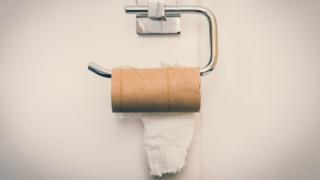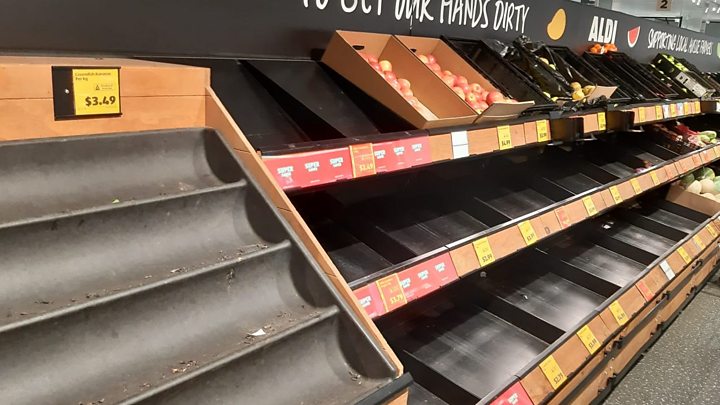Home » Australasia »
Why are people stockpiling toilet paper?
Perhaps the worst doomsday scenario is this: being stuck on the toilet and finding you’re down to the last square.
At least that appears to be the nightmare prospect scaring many Australians right now, who have become the latest group to respond to coronavirus fears by buying toilet paper en masse.
This is despite authorities stressing there is no shortage – given most of the nation’s rolls are made locally.
However in Sydney, the nation’s largest city, supermarket shelves have been cleared in minutes, forcing one chain to enforce a four-pack buying limit.
Police were even called to a dispute on Wednesday, with reports saying a knife was pulled out in an argument over toilet roll between panic buying shoppers.
On social media, #toiletpapergate and #toiletpapercrisis were top trending on Wednesday. Rolls were being flogged for hundreds of dollars online, while listeners were calling into radio stations to win packs of 3-ply loo roll.
The situation in the past 48 hours has unravelled so much there are also reports of people stealing from public loos.
Just what is going on, and why are people acting this way?
An uptick in panic
The toilet paper problem is not unique to Australia – a similar situation besieged places worse-affected by the virus, such as Singapore, Japan and Hong Kong.
Last month, armed robbers stole pallets in Hong Kong following panic-buying induced shortages there. There are reports of toilet paper buy-ups in the US as well.
In Australia, the frenzy began on the weekend after new cases of Covid-19 emerged and the first local death was reported.
Australia’s infection numbers had initially plateaued in the first weeks after the outbreak, following a strict travel ban on visitors from China.
What do I need to know about the coronavirus?
Reports then on the weekend of an uptick in cases sparked renewed alarm.
As of Wednesday, Australia had recorded 41 cases of Covid-19, and one death. These are numbers significantly lower than that of other nations.
Official guidance advised people to practice good hygiene and wash their hands. It was also suggested that people could prepare two weeks worth of food and water, as well as other household goods, if they felt it necessary.
The demand for toilet paper surged – ahead of long-life food and other non-perishable goods. Posts on social media showed customers seizing rolls and piling packets on trolleys.
Amid these reports, authorities have urged the public to stop panic buying.
Australia’s chief medical officer Dr Brendan Murphy told parliament this week: “We are trying to reassure people that removing all of the lavatory paper from the shelves of supermarkets probably isn’t a proportionate or sensible thing to do at this time.”
Supermarkets Coles and Woolworths have stated there is plenty of stock, while the manufacturer of Kleenex toilet paper in the nation said it was now operating 24hr production lines to meet demand.
The government has said that the nation is well-prepared, and taking all active measures to contain the virus. Local cases of transmissions have been relatively isolated so far.
However the toilet-roll buying frenzy continues.
Driven by fear
The buy-up has provoked a collective cringe in some areas. Online, commentators are flummoxed over the need for an item which, were it to run out, does have rougher substitutes.
Some have called it the “dumbest” crisis drummed up by Australians so far. Others have pointed out, that compared to medicines or face masks or hand sanitiser, it’s not even an item that helps to combat the virus’ spread.
Consumer psychology experts say the behaviour is “obviously irrational”, and a clear example of herd mentality whipped up by social media and news coverage.
The pictures of bare aisles haven’t helped.
“What you’ve got to remember is that when 50 packs of toilet paper rolls disappear off shelves, you really notice it because they take up so much room,” says Prof Debra Grace from Griffith University.
“It’s much more noticeable than say 50 cans of baked beans or hand sanitiser disappearing.”
FOMO syndrome – or Fear Of Missing Out – is in full force here says Associate Professor Nitika Garg from the University of New South Wales.
“They think if this person is buying it, if my neighbour is buying there’s got to be a reason and I need to get in too,” she told the BBC.
Prof Garg compares the rush to what occurred in many Asian nations. She notes that in China for example, there was a greater motivation to stock up on white ply because “there’s a thinking that toilet paper can be substituted for tissues and napkins and to make makeshift masks”.
Using toilet paper as a medical resource isn’t fuelling the Australian demand so far, she says. The local buy-up is driven by fear.
She suggests the situation is unprecedented. Australians have stocked up on household goods before but it’s been due to a natural disaster like a bushfire or cyclone, and restricted to certain communities.
“But when it comes to coronavirus, people aren’t certain as to how things are going to pan out, or how much worse it’s going to get,” Prof Garg says.
“They want to be prepared because it’s the one thing they can do to get some sense of control.”
Another consumer expert, Dr Rohan Miller from the University of Sydney, believes it is a reflection of an urbanised society and lifestyle where modern convenience reigns supreme.
“We’re not used to shortages and scarcity, we’re used to being able to pick and choose what we want, when we want. So the rush to get toilet paper is just this sheep mentality to maintain that status,” he says.
Soft, white squares of toilet roll – marketed with pictures of puppies and pure snow – are a daily “luxury” that Australians and others just aren’t willing to mentally part with.
“I think people want to make sure they have some comforts in their lives if they’re going to be shacked up with their family for a long time,” he says.
“Toilet paper doesn’t really matter – it’s just so far down the survival list compared to other things like food or water – but it’s just something people cling to as a minimum standard.”
Source: Read Full Article




